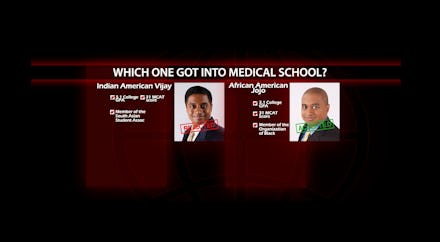Mindy Kaling's Brother "Posed as Black" to Get Into Medical School

Vijay Chokalingam, brother of The Mindy Project star Mindy Kaling, said he was admitted to the St. Louis University Medical School in 1999 with grades and test scores that weren't up to par because he claimed to be black on his application.
In his forthcoming book, Almost Black, Chokalingam offers the experience as a reason to oppose affirmative action programs. Although these practices have been lauded for helping to level the playing field for groups that have been historically marginalized in American society, Chokalingam set out to prove that affirmative action is discriminatory and ignores merit as a key factor in hiring and college admissions.
It seems Almost Black is one "project" Mindy wants nothing to do with. In an interview with the New York Post, Chokalingam said his (reportedly estranged) sister thinks the book "will bring shame on the family."
Smart move.
How he did it. Instead of using his first name, Vijay, Chokalingam applied with his middle name, Jojo — purportedly because he believed it would reduce suspicion while he posed as a black man in his application and on campus. On his website, he also said he shaved his head, trimmed his "long Indian eyelashes" and joined the Organization of Black Students while studying at the University of Chicago, an activity he touted on medical school applications. Chokalingam said he received more than 20 invitations to apply or interview at various medical schools across the country, including some Ivy League institutions.
He attained a 3.1 GPA as well as a 31 score on the MCAT, credentials that barely fit the profile of the successful medical school applicant, based on historical data. As BuzzFeed notes, current successful applicants for St. Louis University have an average 3.84 GPA and MCAT score of 33.
Chokalingam left medical school after two years, and applied to the University of California, Los Angeles Anderson School of Management, identifying as Indian-American and using his first name. UCLA accepted Chokalingam, and he earned his MBA.
Why this so-called experiment fails: The experiment, which was not scientific, is a weak argument against affirmative action. Chokalingam apparently did not submit two separate applications to each school, one as an Asian-American and another as an African-American, so it is not clear whether race solely afforded him the ability to gain admission without the necessary qualifications.
Despite this "experiment," affirmative action has demonstrated merit, as many people of color have been historically excluded from institutions of higher learning. In fact, 63% of Americans support affirmative action on college campuses, according to an April 2014 poll by the Pew Research Center. The majority of respondents in an April 2013 CBS News/New York Times poll said their support was because the programs increase diversity on college campuses.
Even further, to advance his anti-affirmative action stance, Chokalingam appropriated black identity through the act of posing. In doing so, he apparently believes that he gleaned special insight into what it means to live in America as a black man: "Cops harassed me. Store clerks accused me of shoplifting. Women were either scared of me or couldn't keep their hands off me," he wrote. "What started as a devious ploy to gain admission to medical school turned into [a] twisted social experiment."
Anyone can "pose" as black, but they'll never truly know what it's like to be black. Rather than advance a conversation about moving society forward towards equal opportunity, this experiment perpetuates the stereotype that incompetent black and brown people somehow gain an unfair advantage over those who "worked harder" to get jobs or college admission. It's an idea we could do without.